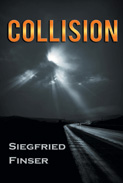
 |
A mega corporation (Premium Technical Products-PTP) recently acquires a small but highly profitable and well-respected company (Croton Green-CG) whose main product line is grass seed. PTP CEO Armand Dillon has his own spin on how CG will be run under his direction, leaving the CG staff not only displeased but also extremely uncomfortable. What becomes of CG’s product line and its staff is simple: Armand’s world of corporate greed swallows them up. CG is only the beginning of PTP’s acquisition since, naturally, Armand wants more. Top on his list of companies is Alliance for International Communications (AIC). But just how to acquire this company requires a plan—and not just any old scheme, but one that is pure evil.
It is 1971—Vietnam. Young people—particularly college students—are protesting and begin questioning the efficacy of the US government and big business. An unlikely connection takes place between Vietnam veteran Stewart (Stu) Brand and Robert McLane, the son of a father entrenched in the corporate domain at AIC. Although coming from different backgrounds and viewpoints, these Fairmount University students quickly develop a friendship. Unfortunately, Stu and Robert have no idea that they will become entwined in Armand’s sinister attempts to overtake AIC. What Armand doesn’t know is that there is more in store when his scheme heads in an unanticipated direction.
Finser shines a light on corporate greed in his latest read. Keeping to a small but tight cast, Finser combines stereotypical and untypical characters into a series of unanticipated circumstances. Finser places his distinct characters at times placed within stilted dialogue scenes. The idealistic interchanges between Robert and a girl he immediately falls in love with, Jolene Senter, makes for a perfect example. Regardless of the awkward moments, Finser manages to incorporate enough situational changes to provide continual plot movement.
A key feature Finser uses to keep his story flowing is alternating character scenes. A delicate balancing act between the good and evil, Finser captures both sides of the coin in the corporate realm. Obviously, the chief antagonist is Armand. There are others who fit in the adversary category, but not quite in the same way. Without providing any spoilers, a special notice goes to Lucinda Brahms (AIC CEO) and Charlie McLane (Robert’s dad) who initially embrace the slippery slope of deceit that comes with corporate greed but then has a change of heart.
One aspect of Finser’s story that may be a draw for readers is his 1971 historical setting. While much of the storyline focuses on the character and their interactions with one another, Finser weaves the nuances prevalent of that era, such as the mindset of many college students (i.e., free speech, engaging discussions about truth and fallacies). Readers with a political interest may find the international corruption aspect of the story both appealing and fascinating. While Finser doesn’t add anything new or enlightening to corporate-based narratives, readers surely will grasp the plot’s light overtones to the political tenor taking place today.
RECOMMENDED by the US Review